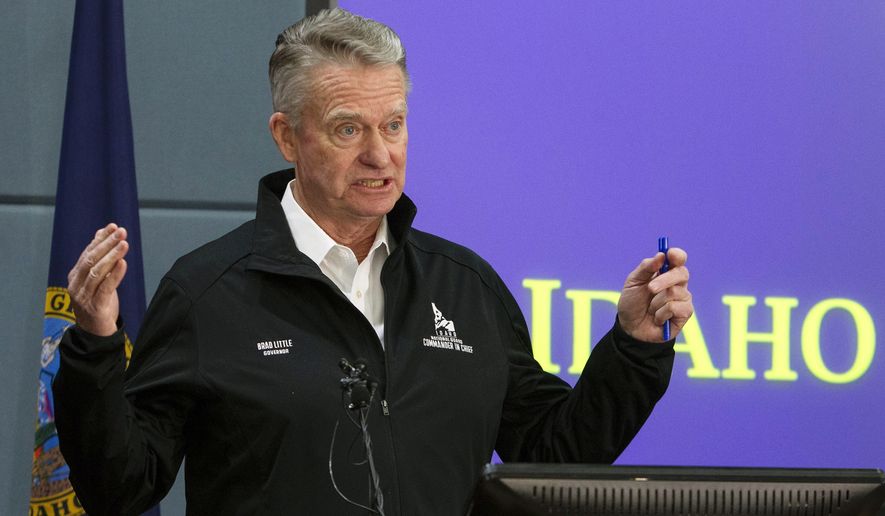The American Civil Liberties Union filed a lawsuit Wednesday challenging Idaho’s first-in-the-nation law banning biological males who identify as female from competing against girls and women in school sports.
The lawsuit, filed in U.S. District Court in Boise, named as the plaintiff Lindsay Hecox, a transgender track athlete at Boise State University, as well as 17-year-old girls’ soccer player at Boise High School who is not transgender, but fears the law could invade her privacy by requiring her to prove her sex if challenged.
“In Idaho and across the country, transgender people of all ages have been participating in sports consistent with their gender identity for years. Inclusive teams support all athletes and encourage participation — this should be the standard for all school sports,” said Gabriel Arkles, senior staff attorney with the ACLU’s LGBT & HIV Project.
The lawsuit, which argued that the law violates the plaintiffs’ constitutional rights under the Equal Protection Clause, named as defendants Idaho school officials and Republican Gov. Brad Little, who signed HB 500 into law on March 30.
“I think that the issue is the girl’s right to participate without having to be concerned about who they’re competing with,” Mr. Little told KTVB-TV in an interview last week. “And that’s why I signed the bill.”
The bill’s sponsor, Republican state Rep. Barbara Ehardt, a former Division I college basketball athlete and coach, argued that allowing transgender athletes to compete in girls’ and women’s sports creates an unfair playing field, citing the natural physical advantages of boys and men.
“It is sad to think that there are those who would prevent girls and women from competing in their own sports while continuing to give more opportunities to boys and men,” said Ms. Ehardt in an email.
The bill states, “Athletic teams or sports designated for females, women, or girls shall not be open to students of the male sex.”
For athletes whose sex is disputed, “a student may establish sex by presenting a signed physician’s statement that shall indicate the student’s sex based solely on (a) The student’s internal and external reproductive anatomy; (b) The student’s normal endogenously produced levels of testosterone, and (c) Analysis of the student’s genetic makeup.”
Ms. Ehardt said an athlete’s sex could be determined through routine sports physicals that students undergo before participating on school teams, but Mr. Arkles said the law “subjects all female athletes to the possibility of invasive genital and genetic screenings.”
When @GovernorLittle signed a law to ban trans athletes, he sent a message that trans people do not deserve the benefits of sports available to their peers. He is wrong and today along with @CooleyLLP and @Legal_Voice, we will sue. @ACLU @IdahoStatesman. https://t.co/fRtPid7um4
— ACLU of Idaho (@acluidaho) April 15, 2020
’We can’t compete’: Legislator behind Idaho’s transgender ban driven by women’s basketball career - https://t.co/uOaQqrKspa - @washtimes #BarbaraEhardt #IDleg #LGBT #TitleIX #ACLU
— Valerie Richardson (@ValRichardson17) April 1, 2020
In Connecticut, the conservative Alliance Defending Freedom sued in February on behalf of three teen girls’ track athletes sued to overturn state rules allowing transgender participation in girls’ sports, arguing that their scholarship opportunities have been threatened after losing races to transgender competitors.
The Justice Department issued last month a statement of interest challenging the Connecticut Interscholastic Athletic Conference, saying that interpreting Title IX to encompass gender identity would “turn the statute on its head.”
“Title IX and its implementing regulations prohibit discrimination solely on the basis of sex, not on not on the basis of transgender status, and therefore neither require nor authorize CIAC’s transgender policy,” said the DOJ statement.
The Idaho lawsuit, which was filed by the ACLU as well as attorneys from the law firm Cooley, LLP, took the opposite stance.
“By discriminating and invading privacy, HB 500 violates the U.S. Constitution and Title IX, and we look forward to presenting our arguments to the court,” said Kathleen Hartnett of Cooley, LLP in San Francisco.
While similar bills were filed this year in other states, Idaho was “the first state to impose an outright ban on participation of transgender athletes and the only with a statewide law regulating transgender and intersex athletes in the country,” said the ACLU.
Ms. Ehardt, who played point guard at Idaho State University, said she felt an obligation to “preserve the same opportunities for those girls who follow.”
“Boys and men are just physically bigger, stronger and faster,” she said. “We cannot compete against the inherent physiological advantages that they possess, regardless of hormone usage.”
• Valerie Richardson can be reached at vrichardson@washingtontimes.com.




Please read our comment policy before commenting.